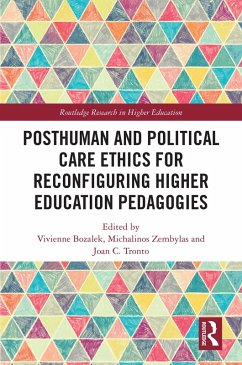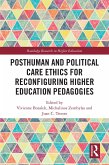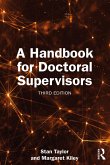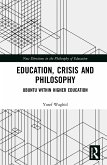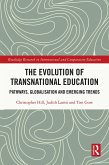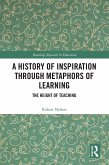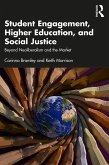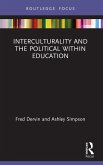The book considers how the political ethics of care and posthuman/new feminist materialist ethics can be diffracted through each other and how this can have value for thinking about higher education pedagogies. It includes ideas on ethics which push those boundaries that have previously served educational researchers and proposes new ways of conceptualising relational ethics. Chapters consider the entangled connections of the linguistic, social, material, ethical, political and biological in relation to higher education pedagogies.
This topical and transdisciplinary book will be of great interest for academics, researchers and postgraduate students in the fields of posthuman and care ethics, social justice in education, higher education, and educational theory and policy.
Dieser Download kann aus rechtlichen Gründen nur mit Rechnungsadresse in A, B, BG, CY, CZ, D, DK, EW, E, FIN, F, GR, HR, H, IRL, I, LT, L, LR, M, NL, PL, P, R, S, SLO, SK ausgeliefert werden.
Maria Puig de la Bellacasa, Associate Professor at the Centre for Interdisciplinary Methodologies, University of Warwick, UK and author of Matters of Care: Speculative Ethics in More than Human Worlds
"This book rigorously addresses from different contemporary scholarships one of the highest challanges of our time, one of our most pressing philosophical and feminist concerns: the issue of care."
Bracha L. Ettinger, artist, philosopher, training psychoanayst (WAP, NLS, TAICP), author of The Matrixial Borderspace
"Care carries a weight, a responsibility. It is both worry and attunement to. It is caru - anxiety, sorrow, grief. It is karo - lament- and kara - trouble. Care, in this volume, risks this multilayering of sense, grappling with the uneasiness of a way of teaching that refuses to claim in advance how the living and learning happens. This is its wager: dwell in the cultivation of difference and respond to the tensions it reveals. Be in the lament, stay with the trouble. Be moved, be carried. This is what education needs today - that we become participants in a process that changes us, that attunes us to what exceeds us and the increasingly limited accounts of what else knowing can be."
Erin Manning, Professor in the Faculty of Fine Arts, Concordia University, Canada

